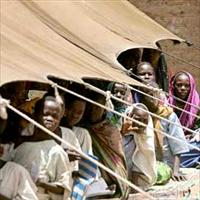Top ten most underreported humanitarian stories of 2007 - Civilians caught between armed groups in Central African Republic

Fighting between government forces and various rebel groups in northern Central African Republic (CAR), which started in late 2005, has caused significant displacement of the population. In the northwest, villages have been attacked, pillaged, and burned, forcing people to flee into the surrounding, inhospitable forest, and severely restricting their access to health care. Civilians are also the victims of violence at the hands of roadside bandits.
In 2007, MSF supported health structures and provided primary and secondary health care in and around Kabo, Batangafo, Paoua, Kaga Bandoro, Markounda, and Boguila in the northwest, and Birao and Gordil in the northeast. In the first eight months of the year, more than 100,000 consultations were carried out and tens of thousands of people—many of them children under five years of age—were treated for malaria and other infectious diseases often associated with poor living conditions. Acts of harassment and general insecurity frequently forced MSF to stop its mobile clinics on short notice, which sometimes left people without access to health care for up to eight weeks.
In June, MSF aid worker Elsa Serfass was shot and killed by rebel gunfire, leading to a lengthy reduction of MSF operations in northwestern CAR. The violence in the northwest has also forced close to 30,000 people into neighboring Cameroon, where they have suffered from a lack of shelter, food, and medical assistance. During the year, MSF carried out a nutrition intervention after alarming rates of malnutrition were discovered among children within this refugee population.
Affected children were treated and MSF also carried out distributions of supplementary food rations. More than 45,000 CAR refugees also gathered in southern Chad, where MSF works in a district hospital and provides assistance to refugees in camps and local residents. In parts of Vakaga province in northeastern CAR, home to approximately 45,000 people, violence between rebel groups and government troops has forced thousands of people to flee their destroyed homes and villages.
Many sought safety in the nearby forest. The region suffers from a near-total lack of health care and MSF provided assistance to the beleaguered population through mobile and fixed clinics in Birao and Gordil.
 Back and Next - Back and Next
Back and Next - Back and Next See Also - See Also
See Also - See Also